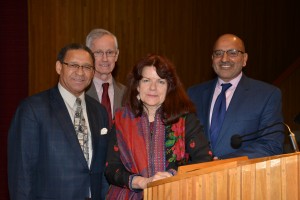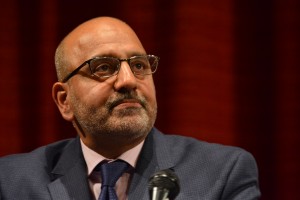Speakers: Marcia Hermansen and Ebrahim Moosa
Marcia Hermansen, director of Islamic World Studies Program and Professor of Theology at Loyola University begins the discussion by pointing out that for most of us today, reconciliation primarily represents a desirable outcome of resolving social and political conflicts and explains how current events involving Islam seem to demand reconciliation in an especially urgent way.
Hermansen continues by exploring the ample resources in the Islamic tradition that talk about forgiveness, mercy and rejecting vengeance in favor of forgiveness. She explores how accountability and restorative justice must be present for true reconciliation to be achieved, explaining that to get there the integration of the two dimensions of reconciliation, the socio-political and theological, must be present to realize such aspirations.
Hermansen concludes by recognizes that the language commonly used to speak about reconciliation is dominated by Christian understandings, but that the distinctive elements of reconciliation in the Islamic tradition can help broaden the conversation, especially in situations of injustice and conflict that are crying out for new ways to pursue justice.
Ebrahim Moosa, a Professor of Islamic Studies at the Kroc Institute for International Peace Studies at Notre Dame, continues the conversation by explaining the basic model in Islam for reconciliation, which is to first repent, then to do acts of good, and finally to confess transgressions and what lead to them so that others may understand how to avoid making the same mistake. He then suggests that this basic model must go beyond the individual by calling for all nations to create an ethics of accountability where the pursuit of reconciliation is embraced as a collective social responsibility.
He expands on this idea by introducing another way to talk about reconciliation, which he calls Transformative Reconciliation. This idea is based on the belief in Islam that good and evil can never be equal and that you must repel evil with something that is better, something that is beautiful, and something that is excellent. He explains that achieving this requires you to transform your enemy into your best friend. Moosa acknowledges that this of course is not easy and requires deep patience in times of adversity, but the collective decision to turn ones enemy into a friend is precisely what our world demands today.
CLICK HERE to watch a video recording of the Seminar.
The seminar was a joint initiative of the Desmond Tutu Center and the Center For Faith and Vocation.






